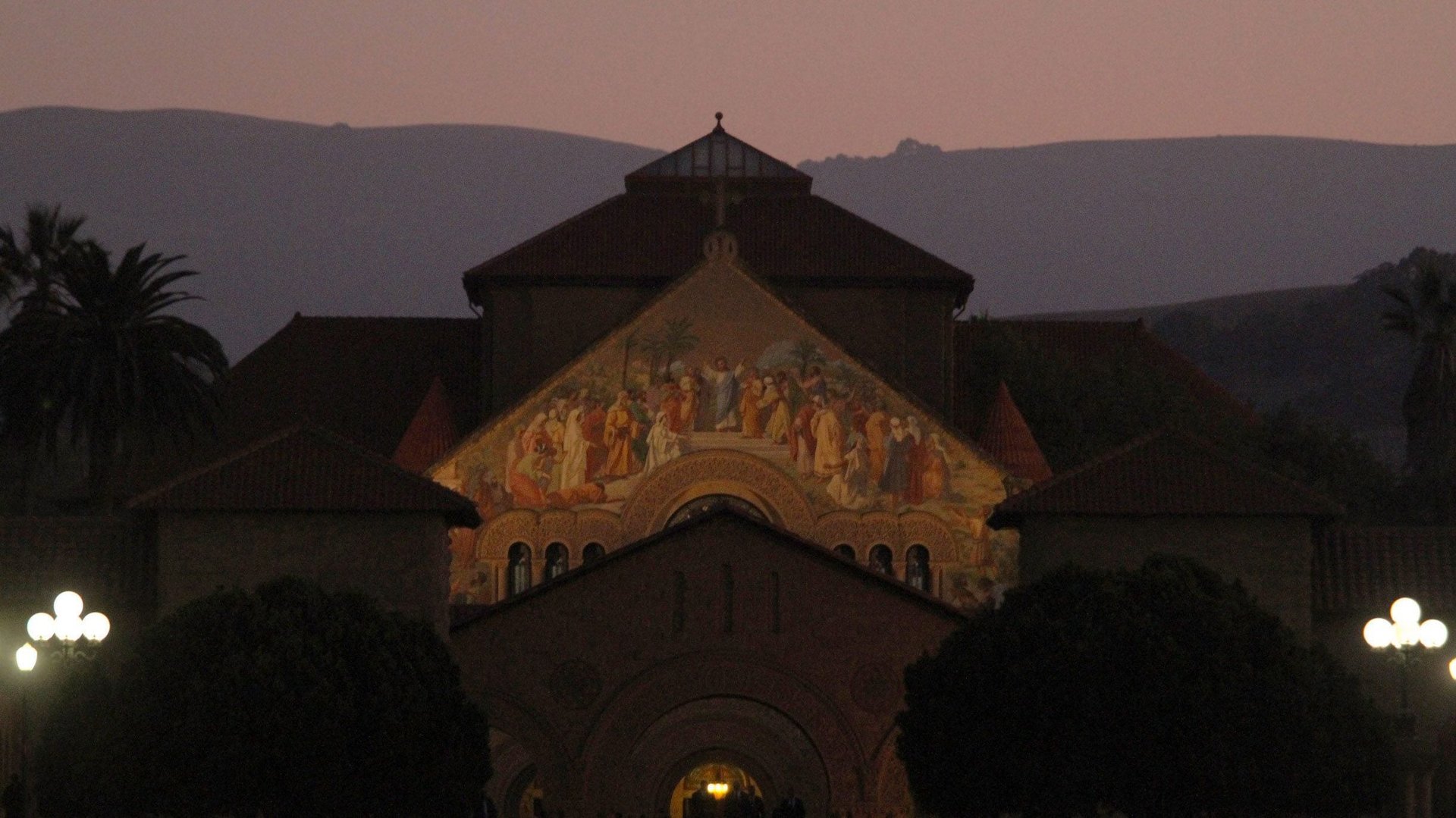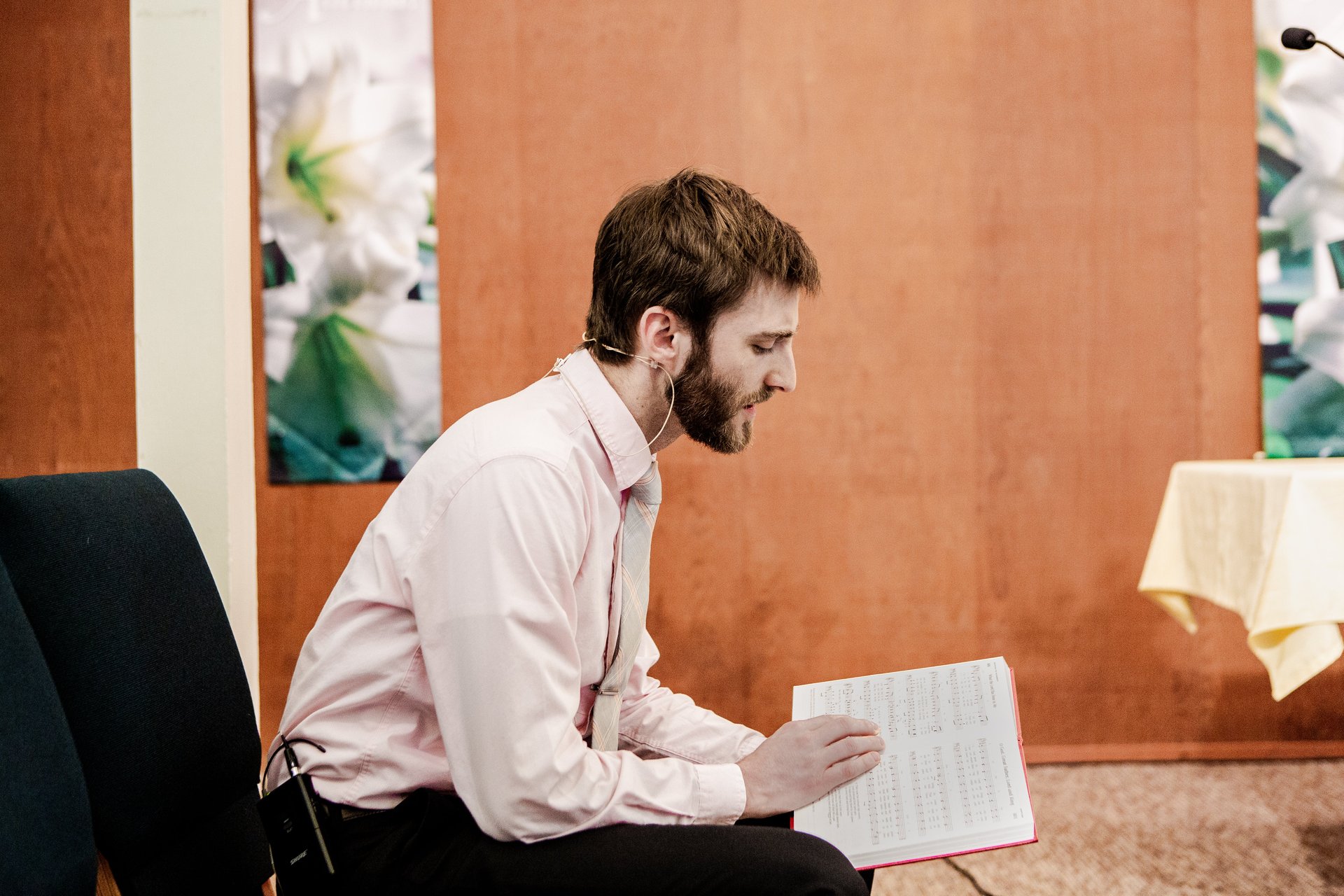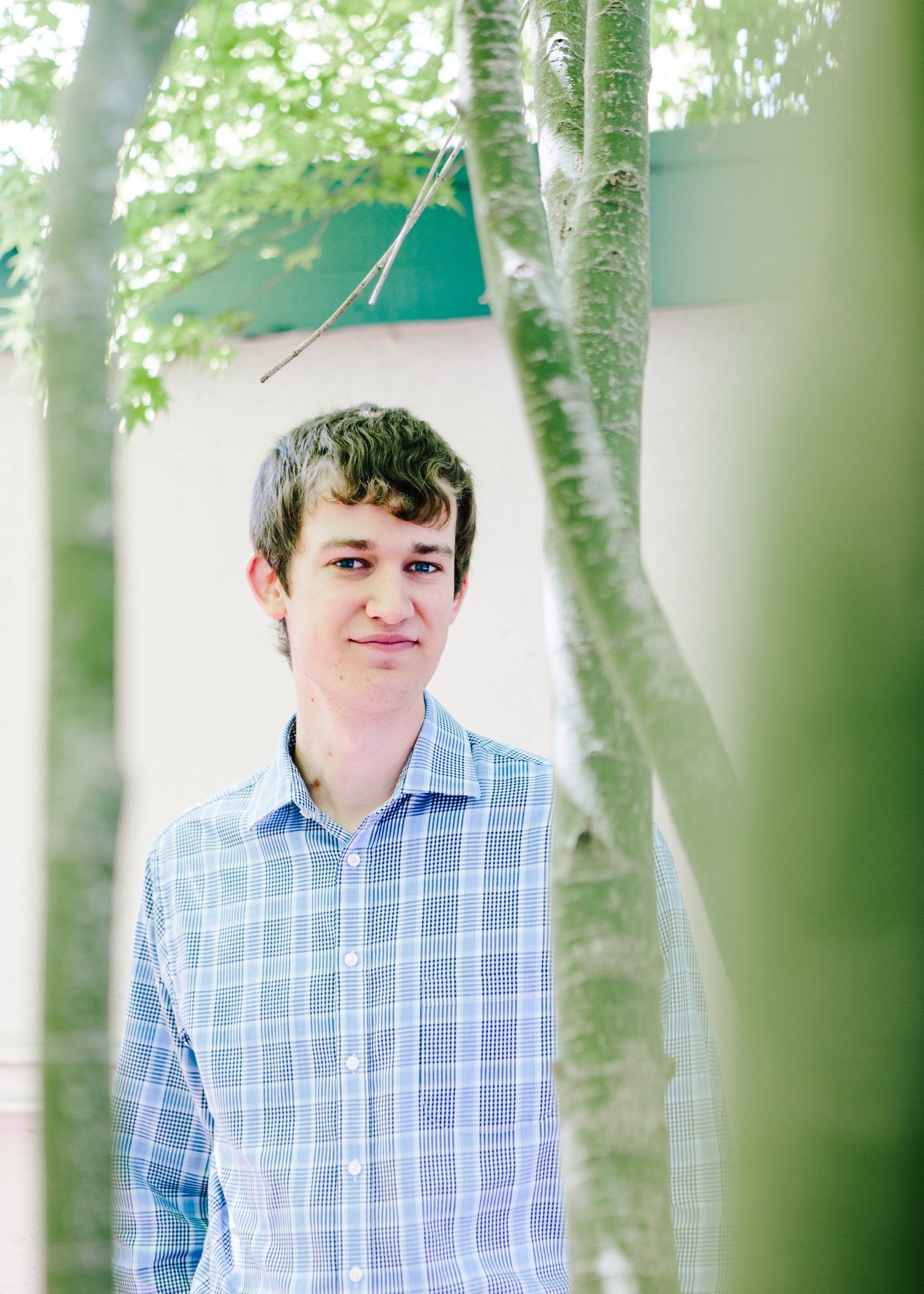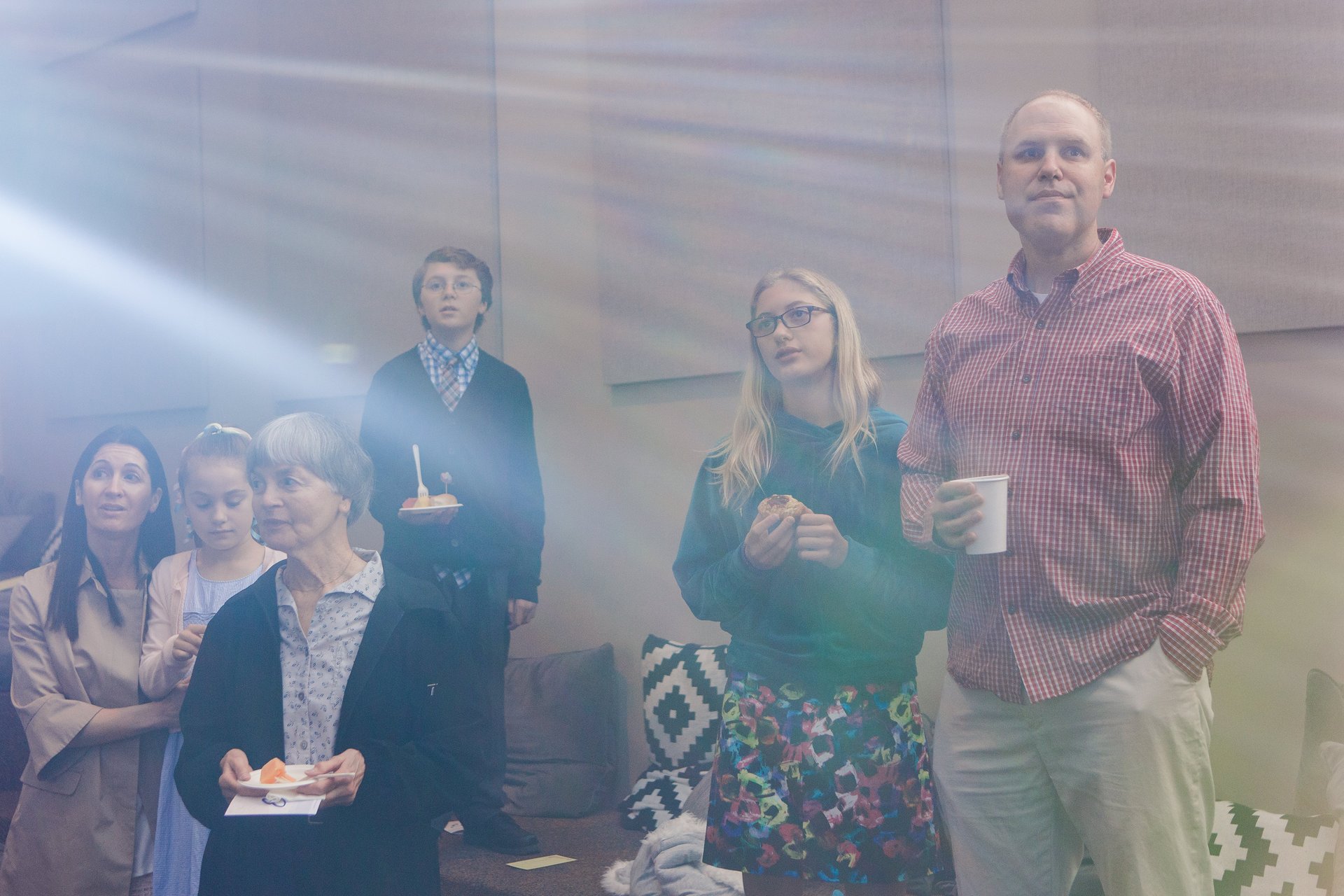How to talk about God in Silicon Valley
On Palm Sunday, a week before Easter, there are still plenty of good seats available at the Palo Alto Christian Reformed Church.


On Palm Sunday, a week before Easter, there are still plenty of good seats available at the Palo Alto Christian Reformed Church.
Located on a sleepy side street, nestled between suburban cul-de-sacs and a sprawling cemetery where Steve Jobs is buried, it’s easy to miss. My Lyft driver did just that before making a lazy U-turn that got me to the church, but not on time. The service was underway as I slunk toward a seat toward the rear, drawing curious glances from the parishioners scattered about.
The church’s interior is modest. A few simple banners hang from the wood-paneled walls, with “hosanna” and “allelulia” in lower-case block letters. Matthew Burns, the 31-year-old pastor, is also restrained in appearance. He’s wearing a sweater vest over a lavender shirt, and preaches from a simple lectern on the floor, not an altar.
Jesus deliberately waits for Lazarus to die before coming to Bethany, Burns tells us. The miracle Jesus offers isn’t that he prevented Lazarus from dying, Burns says, but that he resurrected him after he died. Death is built into life. There’s no salvation without suffering, no heaven without grief.
“The tomb steals the light from even the brightest lights of this world,” Burns preaches. “Yeah, we can heal, we can cryofreeze, we can fill the world with material prosperity and pop songs and pretend it’s not real, but we cannot, we cannot stop death.”

And yet, just a few miles away in every direction, Silicon Valley companies are attempting to do just that.
For tech moguls, immortality is the newest growth sector. Whether owned by Google or funded by billionaires like Larry Ellison and Peter Thiel, numerous startups are attempting to stop aging and to prolong life, indefinitely if possible. “Death has never made any sense to me,” Ellison told his biographer. The Oracle co-founder has poured more than $430 million into anti-aging research.
The search for eternal life is just the most obvious manifestation of Silicon Valley’s utopian impulses. From freeing information to connecting communities, the tech world is convinced not just of the righteousness of its work, but that its work can improve, or even perfect, the world.
Just read through the value statements of tech’s biggest companies. Facebook wants “to give people the power to build community and bring the world closer together.” Google says “our goal has been to develop services that significantly improve the lives of as many people as possible.” Microsoft wants to “empower every person and every organization on the planet to achieve more.”
There’s a strong current of belief in Silicon Valley, but it’s not in organized religion. The San Francisco Bay Area is among the least religious regions of the US, according to the Pew Research Center, with only 42% of adults saying they believe in God with absolute certainty (compare that to 71% in Atlanta).
Traditional religion in the Bay Area is being replaced with another sort of faith, a belief in the power of technology and science to save humanity. It’s a creed that says poverty and disease are simply programming challenges yet to be solved, bad code to be debugged. There’s a reason technologists use words like “evangelist” and “mission” to talk about themselves and their work.
Farther out on the fringes is the belief in the technological singularity, the idea that artificial intelligence will evolve to a point where it surpasses human intelligence, resulting in a fundamental transformation of civilization. In some versions of the theory, people will merge with machines. Humans will become both obsolete and eternal.
For men and women immersed in the old-fashioned sort of religion, Silicon Valley’s faith in itself is a challenge. How can a religion based on ancient texts hope to compete with something as new and exciting—and sacrifice-free—as technology’s promise?
Not wanting to be a “stereotypical Christian”
Silicon Valley’s Christians describe life as an uneasy negotiation, between expressing their faith as called for by the Bible and integrating themselves into secular workplaces where religion is viewed, at best, as an anachronistic curiosity, and at worst, as a malevolent force.
I spoke with Christians working at some of tech’s biggest companies and at small startups. None says they’ve experienced overt hostility, and most find their colleagues welcoming and curious. Yet they also feel wary, with a sense that their beliefs cast them as outsiders, and that one false move could invite derision or worse.
Jesus admonished his followers not to hide their light, yet many Christians I spoke with admitted to being cowed by the Bay Area’s progressive, technocratic monoculture.
“Part of being a Christian is sharing the good news, so I feel stifled,” says Betsy Lindemulder, a data analyst at a pharmaceutical company. “I’m afraid of stepping on anyone’s toes. I want to be a Christian without being a stereotypical Christian.”
Lindemulder is a member of the Palo Alto Christian Reformed Church. After Burns’ sermon ends, she’s among the few parishioners who approach me to introduce themselves, and politely inquire why I was frantically scribbling notes during the sermon.
A cheerful, middle-aged woman with midwestern roots, Lindemulder says she’s the daughter of a missionary. The contrast with her own religious experience pains her. “His whole career was speaking out, and I feel afraid to speak out.”
Congregants of the Palo Alto church share the burden of being evangelicals in a country that associates that strain of Christianity with fundamentalism and conservatism. “When you identify as a Christian, that’s kind of the pigeon hole you get put in,” said Todd Hoeksema, an astronomer at Stanford. Being lumped together with anti-science denominations is particularly rankling, he says.
The fight over gay marriage has further strained Christians’ reputation in the Bay Area, a region that has fought the longest and hardest for gay rights. The official doctrine of the Michigan-based Christian Reformed Church is that homosexual acts are a sin (although homosexuality itself is not), a position with which some in the Palo Alto congregation disagree.
Burns acknowledges the church’s teachings can be painful for parishioners’ friends and neighbors, and from the hesitation in his voice, it’s clearly a topic he finds difficult to discuss. “We are asked to hold scripture and real people whom we love in tension,” he says. “There’s a cost involved in following Jesus, and that’s often personal.”
Palo Alto Reformed’s congregants bring all that cultural, political, and theological baggage with them when they to go work. It’s a particular challenge for young Christians just embarking on their careers, who must not only navigate the rules of any new workplace, but worry about finding themselves labeled early on as different or close-minded.
Landon Sterk, a lanky 22-year-old, began working as a software engineer at Yelp late last year, his first job after college. When a colleague announced he was taking time off because his father had health problems, Sterk struggled with how to respond in a reply-all email.

“Normally I would say ‘I’ll be praying for you,’ and I wasn’t sure, and I decided to take a non-religious route,” he said. “I was trying to not put myself out there.”
He was chagrined when he saw his non-Christian colleagues were the ones to offer prayers in the group email.
Sterk, who’s a counselor in the church’s equivalent of the Boy Scouts, says he also doesn’t talk to colleagues about his church-affiliated weekend activities. He doesn’t want to be labeled, he says, or give his new co-workers a reason to dismiss his ideas. But his own trepidation gives him pause. “I’m sort of surprised with myself,” he says.
Doing due diligence on Jesus
The gleaming Santa Clara Hyatt Regency, with its Ziggurat-like facade, is only 11 miles from the humble Palo Alto Reformed Christian Church, but the annual Silicon Valley Prayer Breakfast taking place there on a Friday morning in March could be light years away.
More than 900 of the devout and the merely curious packed into the hotel ballroom to hear the good news, and at least another 150 were turned away. The assembled flock ran the gamut, from professional Christians to the tech industry worker bees who make the region hum. At my table were retired executives, a bio-tech investor, a minister, and the CEO of Shepherd’s Gate, a Christian charity that works with abused and addicted women and children.
The headliner was Promod Haque, a venture capitalist and senior managing partner of Norwest Venture Partners. Haque has a long track record of success as an investor—companies he helped nurture have been bought by Google, IBM, and Cisco. He spoke from the stage with the unhurried manner of someone used to deference.
To tell the story of his own religious awakening as a boy in New Delhi half a century ago, Haque used language he knew his audience would understand. After being told Jesus loved him, he began reading the Bible to make sure.
“I was doing my due diligence on Jesus,” he said. His embrace of Christianity “was the best investment decision I have made in my life.”
He applied the logic of an investor to his scrutiny of the 12 apostles, calling them “reference checks” for Jesus. He notes 10 of the apostles were martyred for their beliefs, and says that should serve as proof of Jesus’ divinity. “Would anyone be martyred for a lie?”
The prayer breakfast, now in its 24th year, was organized and hosted by Skip Vaccarello, a former business executive who ran a handful of small software companies. Soft spoken and gracious, Vaccarello has silver hair and the tan of a man who knows how to enjoy retirement.
He grew up as a Catholic in Boston but drifted away as a young man. He attended Harvard during the tumult of the late 1960s, but it wasn’t until Vaccarello had found success later in life that he realized something was missing, and began attending church again in the 1980s. In 2015, he published Finding God in Silicon Valley, an earnest collection of stories about the travails of the area’s believers.
In his retirement, Vaccarello has become a central player in Silicon Valley’s evangelical community, whether through the prayer breakfast or advising Transforming the Bay Through Christ (TBC), a five-year-old organization founded to connect the region’s churches and start new ones. TBC’s board is chaired by Pat Gelsinger, the CEO of VMware, a cloud computing company, and the organization is dotted with executives from the Silicon Valley establishment.
The movement is making inroads, Vaccarello says, “but it’s coming from a very low point. This is one of the least churched areas in the country.”
Unlike cities like Atlanta or Dallas, where religion is part of the currency of daily life, “there’s not a social advantage to being a Christian in Silicon Valley,” he says, “so the people who are here are more committed.”
Welcome to the Menlo Church Cafe
In affluent Menlo Park, visitors enter the Menlo Church Cafe not into a stained-glass lit nave, but through a Starbucks-ish lobby, complete with an espresso machine, where they’re handed tall lattes and muffins. The sanctuary looks like a black-box theater, with rows of folding chairs in a semicircle before a low, wide stage.
Sunday morning’s service starts with a seven-person band playing harmonious, guitar-laden Christian rock. The production values are impressive: Lighting gels bathe the musicians in blues and reds, and three massive video screens above the stage scroll the lyrics over vivid images, like drops of crimson blood swirling through water, and a red-tinged sunset over a mountain forest. Subtle, it isn’t.
The cafe is a branch of Menlo Church, Silicon Valley’s answer to a megachurch. Menlo has seven branches, from San Francisco to San Jose, and claims a weekly attendance of 6,000 congregants.
Founded in 1873 as a Presbyterian church, Menlo is about as old as it gets in the area, but it’s aggressively modern in its approach to marketing and worship. Along with its coffee-friendly service, the church offers a slick website, a dizzying array of groups and classes for every demographic, and even a podcast. It’s all designed to make the church as inviting as possible.
As the band performs, the congregation of 60 or 70 sways, coffee cups in hands, wearing hoodies and puffy Patagonia jackets. Before introducing senior pastor John Ortberg, an assistant pastor plugs the upcoming Good Friday service later that week—there will be a string quartet and a candle-lit, contemplative atmosphere—and reminds us that when it comes time to make an offering, parishioners can give online and text their pledge.
Ortberg appears on the video screens above the stage, beamed from Menlo’s main branch. Slim and silver-haired, he wears his shirt unbuttoned, smiles easily, and speaks with a folksy twang. He introduces his theme: A single line from the gospel—Matthew 7:12—from Jesus’ Sermon on the Mount, popularly known the Golden Rule: “In everything do, do to others as you would have others do to you. For this sums up the law and the prophets.”
“This is discipleship for everybody,” Ortberg says. “I don’t care if you believe in God or not, what you think of miracles or the supernatural or life after death, you can start with this: This will keep you busy enough all day long.”
The Golden Rule teaches us to be open minded, to accept others, to think and act selflessly, he says. “It moves you from ego to love. It is an unlimited opportunity for creativity.”
To prove his point, he spins a lively account of living “a Golden Rule Friday,” in which all his decisions were based on thinking about what others would want. His wife had to wake up at 4 am for a trip, so he got up with her and made her breakfast.
When she texted in alarm from the San Francisco airport, saying that she had left her car there but had forgotten she’d be flying home into San Jose, Ortberg says he volunteered to retrieve it in the spirit of Golden Rule Friday. “If I was dumb enough to have left my car at the wrong airport, I’d like my spouse to pick it up for me, and I did. Now, if I had left my car at the wrong airport, I probably won’t like it if my spouse told everybody I was dumb enough to do something like this, but this isn’t Golden Rule Friday, this is selfish Sunday, so it’s OK.”
The audience erupts in laughter, and Ortberg wraps up quickly, sending the congregation out without any final prayers, but a simple adominition to follow the Golden Rule.
The sermon is engaging, thoughtful, and even fun, but surprisingly light on religion. Versions of the Golden Rule existed in ancient Egypt and Greece long before it was articulated by Jesus, and it’s since been re-interpreted by thinkers from Immanuel Kant to John Rawls as part of a larger discourse about morality and ethics. It’s not hard to imagine the same lively lecture about Golden Rule Friday in a freshman philosophy course, with no mention of Jesus necessary.
The light touch is by design, Ortberg says.
“I want to always remember someone who has never been in a church before and not assume biblical literacy or a biblical knowledge base,” Ortberg tells me later by phone. “As a church, we try to present (Jesus’) teachings and his person in a way that’s accessible to folks who live in the Bay Area, who might have thought that Christianity is kind of off the table, that it’s no longer a viable intellectual option, but have not given it serious thought.”

There’s a huge hunger in Silicon Valley for what Christianity can teach, he says. The tech culture’s pressure to succeed and perform can play havoc on individuals and families, leading to depression, divorce, and addiction, he says.
“There’s a ton of isolation in the Bay Area,” he says. “Hardly anyone moves here because of a relationship. So often they move out here for economic opportunity, and there’s a deep, deep loneliness. There may be a lot of material affluence, but a lot of relationship poverty and spiritual poverty.”
The religion of success
Despite its ambitions and lofty view of itself, evidence abounds that Silicon Valley’s trajectory toward a utopian future has gone askew. Facebook is accused of spying on its users and undermining democracy. Forums like Twitter and Reddit have become breeding grounds for racism and misogyny. Google has abandoned its “don’t be evil” principles, and now works with the Pentagon to build more-lethal drones.
Elise Machiele, a thoughtful young woman from Michigan I met at Palo Alto Reformed, sees a frustrating aimlessness in much of the tech world, a lack of purpose in the products that blurs into a lack of purpose in the lives of the young men and women who spend their days and nights building them.
“Their goals are not our goals, and we don’t even have a common vocabulary with them to talk about how their goals are different from ours,” says Machiele, who works at a tech giant she asked me not to name.

She has a friend who has done well building apps, but has no foundation or sense of greater meaning. He’s never been exposed to hardship or loss, and serves no master but his own entertainment. “He sees that Silicon Valley’s religion is really success,” she says. “All their lives, these people have been successful and they don’t need a savior.”
Machiele embodies the struggle of Christians who want to lead their friends to Jesus, yet are daunted by the obstacles—cultural, social, and even educational—that it would require. Instead, she hopes her example may lead them to come to her with questions, she says. “It’s not always my job to be evangelizing, but maybe it is my job to live in a way that people can see what God has done for me.”
Burns, the pastor, sees a search for meaning throughout Silicon Valley. There is “Icarus-like” ambition in the tech world, in many cases untethered from morality or humility, he says.
“We imagine ourselves the pinnacle of civilization and at the top of the evolutionary pyramid, but we’re also worried that there isn’t anything greater that us, and we’re afraid we’re going to blow it, and blow ourselves, up,” Burns says.
The quest for immortality is another manifestation of that anxiety. While the fear of loss and death is universal, Christians can put their faith in an ancient tradition to guide them through their suffering. Silicon Valley’s moguls instead place their faith in technological progress, and the hope that we need only invent our way out of our grief.
Burns is skeptical. “As Christians, we say ‘Yep, humans can change a lot, but who says we’re changing things for the better?’”
Misbehaving Christians
In a recent episode of HBO’s Silicon Valley, DeeDee, the developer of a gay-dating app, is outed as a Christian, sending his startup’s future into doubt. “It freaks people out that he’s Christian,” says one character.
At one point, DeeDee confesses that his parents in Palo Alto are horrified. “My dad says my lifestyle makes him sick,” he says. “He just wants his gay son back.”
The joke is funny because it’s rooted in some truth. In the pluralistic, progressive Bay Area, virtually every slice of humanity is encouraged to feel welcome and express themselves, save one.
Burns recognizes his congregants are in the odd position of being part of the nation’s majority religion, yet feeling as though they’re an embattled minority in their own community. “To be seen as irrelevant or laughable is not a fun place to be,” he says.
He’s quick to say he’s not asking for sympathy; he understands why Christians are viewed skeptically by many in the Bay Area. Organized religion has much to answer for, he says, and the identification of evangelical churches with the Trump White House has made it even harder for liberals to view Christians charitably.
“When you give Christians a whole lot of power, whether it’s wealth or political influence or all of the above, bad things can happen,” he says. “I have Christian brothers and sisters who have misbehaved, so it is trite for me to complain.”
Jan Seerveld, a systems specialist at Genentech and a Palo Alto congregant, says Christians everywhere would benefit from the humility shared by Christians in the Bay Area.
“We don’t get this complacent, proud, domineering, swaggering, judgmental, power-based attitude about everything, which is everything that Christ was not,” she says. “That drug of being in a culturally comfortable world is not good for Christians.”
Christians tend to do better as the underdog, anyway, Burns says. The early church of Paul was an insurgent, taking on the power of Rome. It’s only when Christianity was endorsed by the state that its troubles began. It’s more rewarding to be outsiders, Burns says. “I haven’t done it for that long,” he says, “but it’s fun.”